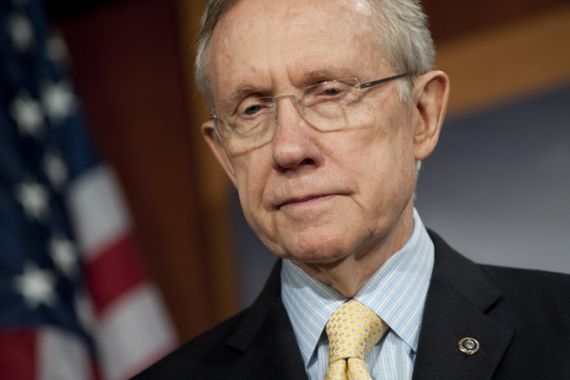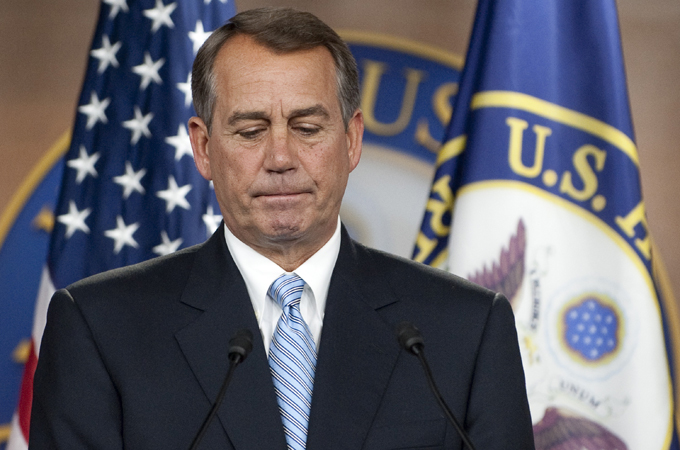US budget talks remain deadlocked
Democratic Senate leader Harry Reid blames ‘extreme’ Republican agenda in fight over ‘ideological’ cuts.

 |
| John Boehner, the Republican speaker of the House, says representatives will approve a short-term spending bill [AFP] |
President Barack Obama and US congressional leaders have “narrowed their differences” but have not reached a budget deal aimed at averting a government shutdown, Republican House Speaker John Boehner and Senate Democratic Leader Harry Reid said.
Their statement came following an 80-minute meeting at the White House with Obama on Thursday.
Keep reading
list of 4 itemsWhy are nations racing to buy weapons?
Parallel economy: How Russia is defying the West’s boycott
US House approves aid package worth billions for Ukraine, Israel
“We will continue to work through the night to attempt to resolve our remaining differences,” the two leaders said in a statement.
An ideological fight in the US Congress over abortion and environmental issues threatens to derail an agreement to avert a government shutdown.
Democratic and Republican leaders held a whirlwind series of private meetings and public news conferences to plead their case for a budget deal that would keep the government operating beyond the midnight deadline on Friday.
“I’m not very optimistic,” Reid told reporters before the evening meeting, blaming the impasse on a Republican push for policy provisions that could block public funding of birth control and stymie environmental protection efforts.
Boehner said there were a number of issues remaining on the table “and any attempt to try to narrow this down to one or two just would not be accurate.”
House Republicans approved a stop-gap bill to push the deadline back a week that includes $12 billion in additional spending cuts and assures Pentagon funding through September 30.
Reid called the short-term extension a “non-starter” in the Senate because of the spending cuts, and Obama vowed to veto it.
“I did express to the president my disappointment that he suggested he would veto that,” Boehner told reporters after the afternoon White House meeting. “We can get to an agreement, but we are not there yet.”
Closed parks and frozen wages
If the two sides don’t reach a deal by Friday’s end, government workers and institutions would begin to feel immediate effects.
Work on government websites would halt and federal employees would be required to stop using their official mobile phones. Employees whose services are crucial for health and safety, such as police, US marshals, and prison and border guards, would continue to be paid, as would workers in the US Postal Service.
But military personnel would see their paychecks stop, and possibly as many as 800,000 federal employees – nearly 20 per cent of the total workforce – would be furloughed.
Workers would also likely be unavailable to process thousands of passport applications, and the government would not be able to endorse any single-family mortgage loans.
All 394 national parks in the United States would close, including the Statue of Liberty and Grand Canyon, resulting in a $32 million daily loss for the government.
Short shutdown wouldn’t hurt growth
A government shut down of a few days would not seriously hurt growth, but one lasting longer than a few weeks could begin trimming economic growth by 0.9 to 0.17 percentage points per week, economists estimated.
Government workers would lose about $2 billion a week if the government shuts down after Friday, meaning that money would not filter through the rest of the economy in the form of spending.
Businesses would not be able to receive key permits to conduct their work, and government contractors who rely almost entirely on federal money would lose their income.
The United States’ AAA debt rating will probably survive the current budget battle, because political leaders were likely going to come to a last-second decision to raise the debt ceiling, Fitch Ratings said on Thursday.
The likelihood of the US government failing to honour its financial obligations, in particular US Treasury securities, is “extremely low,” the agency said.
Democrats blame ‘extreme’ Republican agenda
Reid said fiscal conservatives aligned with the Tea Party movement were driving the conflict by pushing an “extreme” agenda and cheering for a shutdown.
Boehner is under pressure from Tea Party conservatives who helped fuel last year’s big Republican elections gains with promises of deep spending cuts and reduced government.
“If this government shuts down, and it looks like it’s headed in that direction, it’s going to be based on our friends in the House of Representatives, the leadership over there, focusing on ideological matters,” Reid said of Boehner and the Republicans.
With the US economy in the early stages of a recovery from the worst recession since the 1930s, the Obama administration warned of the shutdown’s potential effects on small business owners, applicants for home loans and workers who would be left without paychecks as the result of federal layoffs.
A final deal would clear the way for the House and Senate to vote on funding the federal government through September 30 and put an end to a months-long fight over spending for the fiscal year that is now half over.
Public blames both sides
A government shutdown carries political risks for both parties, which could be blamed by voters for a failure to compromise. Congressional Republicans were largely blamed for the last shutdown, in December 1995 and January 1996.
A Pew Research Center poll found both parties would pay for any shutdown, with Republicans blamed by 39 percent of the public and Obama and Democrats by 36 percent. Another 16 percent would blame both sides equally.
A Democratic congressional aide said a final deal on total spending cuts for the remainder of this fiscal year would probably end up closer to $33 billion than the Republicans’ $40 billion target.
Ethan Siegal, a policy analyst with the Washington Exchange, a private firm that tracks Washington for
institutional investors, predicted the final package would be in the $35 billion range and there would not be a shutdown.
“We continue to believe that there will not be a government shutdown, or at least one of any great significance — meaning anything beyond a weekend shutdown — but we do not even think that will happen,” Siegal said.